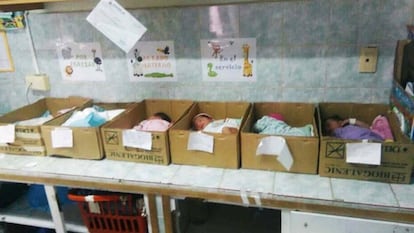Babies in boxes reveal extent of ongoing crisis in Venezuela
A photo of six newborns in improvised cribs in a hospital has quickly gone viral

A photograph has become the perfect testament of the scarcity Venezuelans are enduring. Six sleeping newborn babies in cardboard boxes in Domingo Guzmán Lander Hospital in Anzoátegui state (eastern Venezuela) provide a quintessential portrait of the current crisis in the oil-producing country. The picture has worn down the Nicolás Maduro administration’s efforts to beat back reports of total collapse. The image, taken on a cellphone, has quickly gone viral on the internet.
Infant mortality in Venezuela has climbed from 0.02% in 2012 to 2.01% in 2015
The government’s initial reaction has led to widespread criticism. Anzoátegui Governor Nelson Moreno said: “There’s no bad faith in that. If they are going to use a little box, they handle that little box with great creativity. They decorate it well, fix it up like a layette, and place it there, next to the mother.”
Yet the photograph is a true depiction of the consequences of the Venezuelan crisis. In August, the United Nations Rapporteur for Health expressed concerns about the rising rate of infant mortality in Venezuela, which climbed from 0.02 percent in 2012 to 2.01 percent in 2015. Last year, there were 243,638 births, and 4,903 of those newborns died, according to the Venezuelan Health Ministry. Doctors say infant mortality is on the rise because hospitals lack 85% of the medicines they need and they do not have enough supplies to meet minimum sanitary conditions.
The IMF estimates that inflation in Venezuela could reach 720% by the end of the year
As the medical crisis worsens, some say the Maduro administration has hit back against those who have reported such problems. Manuel Ferreira, director of human rights in Democratic Unity Roundtable (MUD), the Venezuelan coalition of opposition groups, says Domingo Guzmán Lander doctors have faced intimidation for taking the picture. The Venezuelan Institute of Social Security (IVSS), the group that manages the hospital, blamed a doctor for placing the infants in boxes. According to the government, there were seven incubators available last week. “The institute will take the appropriate administrative actions for this kind of mistake and will collaborate if other institutions need to make pertinent investigations,” IVSS president Carlos Rotondaro said. According to Tomás Guanipa, a congressman in the opposition, doctors suspected of sharing the photo were summoned to meet with the Venezuelan national intelligence service.
Cardboard coffins
Scarcity has become a normal part of daily life in Venezuela. The Maduro government’s failed economic policies and falling oil prices only make the crisis worse. Economic projections are discouraging. The International Monetary Fund estimates that inflation in Venezuela could reach 720% by the end of the year while its economy continues to rely heavily on dropping oil prices and imports. Economic woes serve to add to the social drama. Boxes are not only used to make up for a shortage of incubators in hospitals. Many families that cannot afford the high cost of wooden and brass coffins bury their dead in cardboard caskets.
The idea came from Barquisimeto, a city in the state of Lara, in midwest Venezuela. “Right now death impoverishes a lot. The green casket is economical and affordable for Venezuelans who do not have the money to spend at that time,” says Elio Ángulo, an urn designer.
English version by Dyane Jean François.
Tu suscripción se está usando en otro dispositivo
¿Quieres añadir otro usuario a tu suscripción?
Si continúas leyendo en este dispositivo, no se podrá leer en el otro.
FlechaTu suscripción se está usando en otro dispositivo y solo puedes acceder a EL PAÍS desde un dispositivo a la vez.
Si quieres compartir tu cuenta, cambia tu suscripción a la modalidad Premium, así podrás añadir otro usuario. Cada uno accederá con su propia cuenta de email, lo que os permitirá personalizar vuestra experiencia en EL PAÍS.
¿Tienes una suscripción de empresa? Accede aquí para contratar más cuentas.
En el caso de no saber quién está usando tu cuenta, te recomendamos cambiar tu contraseña aquí.
Si decides continuar compartiendo tu cuenta, este mensaje se mostrará en tu dispositivo y en el de la otra persona que está usando tu cuenta de forma indefinida, afectando a tu experiencia de lectura. Puedes consultar aquí los términos y condiciones de la suscripción digital.









































